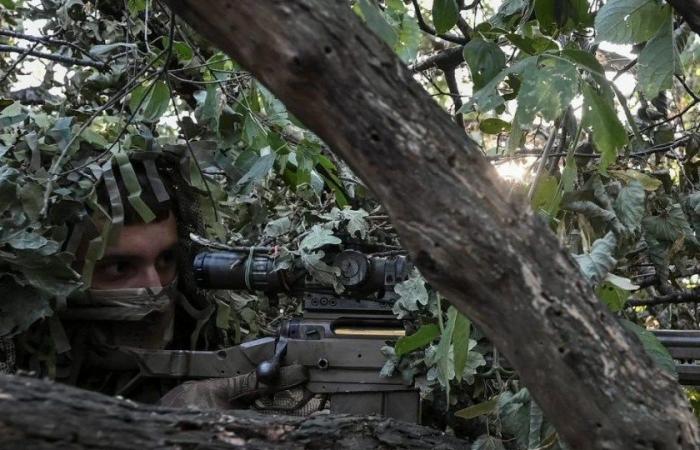The case that Seco looked into concerns the delivery of ammunition for precision shooting.
Keystone
Arms control sanctions a Polish company for sending Swiss ammunition to Ukraine. Despite another agreement with the manufacturer Swiss P Defense from Thun.
This content was published on
November 26, 2024 – 11:26 am
Arms control in Bern is rampant: for the first time, it places a foreign arms company on a “blacklist” for contract violations. Poland-based UMO SP is affected, SRF Investigativ research revealsExternal link.
When questioned, the State Secretariat for Economic Affairs (Seco), responsible for controlling exports of war materials, wrote: “we can confirm that exports to the Polish company concerned will no longer be authorized until further notice” .
What happened? On July 10, 2023, the Thun company Swiss P Defense (formerly Ruag Ammotec) sent 145,000 0.338 caliber sniper ammunition and 500,000 0.308 caliber ammunition to the Polish company UMO SP.
Four days later, UMO SP delivered the ammunition further – from Poland to Ukraine. However, this re-export contravenes the arms embargo and, more generally, Switzerland’s principle of not supporting the delivery of arms to states at war.
What did Swiss P Defense know?
Seco then investigates the case, reported by the NZZ in November 2023 based on the “Defense One” blog. The investigation report is now available exclusively to SRF Investigativ.
It shows that, on the one hand, the controllers identified the two munitions deliveries in question to UMO SP, which had previously been authorized by Seco. On the other hand, they focused on the question of whether the Thun company Swiss P Defense was aware of the resale to Ukraine.
Indeed, “if the Swiss company were aware of a resale/re-export to Ukraine, this would constitute an infringement” of the law, we can read in the audit report.
After examining the documents, Seco inspectors raised the alarm: “The examination did not reveal any indications that Swiss P Defense AG exported the munitions knowing that they would then be re-exported to Ukraine” .
The report notes that the company has taken steps to minimize such risks, including an agreement allowing reuse exclusively “on Polish territory”. The Polish company still delivered the ammunition to Ukraine.
Swiss P does not comment on the cessation of deliveries to its Polish partner and writes generally to SRF Investigativ: “Swiss P Defense always and exclusively delivers to its customers within the framework of the legal provisions in force in Switzerland”.
The industry finds Seco’s decision “reasonable
UMO SP is a “significant partner” for the Swiss arms industry, says Matthias C. Zoller. The latter is secretary general of the arms branch of the industrial association Swissmem. We accept Seco’s decision and find it “reasonable”, he explains.
In his view, “the Swiss company behaved correctly, but the foreign company behaved improperly – so it is right for Seco to enforce the law. However: “It’s just difficult at a time when European neighbors are no longer willing to buy from us. In this context, each customer who disappears weighs heavily,” notes Matthias C. Zoller.
Reactions from the political world
Politicians react positively to the blocking of Seco. Uranian Liberal-Radical States Advisor Josef Dittlifor example, states: “Seco acted correctly, because what happened was a de facto circumvention of our neutrality.” According to him, the Polish company did not respect the contractual agreements with the Swiss company and still delivered ammunition. “That’s where the problem is.”
For cases like this, Swiss legislation is sufficient, believes Josef Dittli. “In other cases and in particular for the future, however, it is completely insufficient, because this would result in our own arms industry receiving significantly fewer orders.”
He advises states that it should absolutely be possible in the future that democratic states which purchased Swiss war material years ago can re-export them under certain conditions.
“For countries that have an export control regime comparable to that of Switzerland, the declaration of non-reexport should be limited to five years,” says Josef Dittli.
An amendment to this effect of the War Materiel Act is currently in preparation. The consultation procedure expired at the end of October 2024.
Possible gaps in the law?
Pour Zurich National Socialist Councilor Fabian Molina also, the intervention of Seco in the “Swiss P” affair is justified. “It is unacceptable that Swiss legislation is not respected by foreign actors. We need measures to show that things are not going well.” But unlike Josef Dittli, Molina believes there may be a gap in the law for such cases.
“It is obvious that action must be taken, otherwise these cases would not have occurred.” The objective of the law on war materials is to prevent Swiss weapons from being found in wars or armed conflicts, recalls the national socialist advisor. It is necessary to improve the means of action so that the objective of Swiss legislation cannot be circumvented by third countries.
For its part, the Polish company UMO SP writes that due to confidentiality agreements concluded with all of its commercial partners, it is not possible to comment on the various transactions.
And to respond generally: “All operations must be carried out in accordance with the directives of the authorities”.
The “Swiss P” case is not an isolated case
The “Swiss P” affair is not an isolated case. According to research by SRF Investigativ, a similar case took place in June 2023: three air pistols from the Ticino manufacturer Morini arrived at a hunting store in Moscow through an Indian company.
This is shown by Russian customs data, prepared by the company Import Genius, which specializes in trade data. Such sporting weapons also cannot be exported to Russia, in accordance with the arms embargo. “The sanctions-related ban includes weapons of all kinds,” writes a Seco spokesperson.
The Morini company said it was unaware of the re-export. She writes that as a producer or distributor it is impossible to track what happens with a product after it is sold: “And even less so in a foreign country or on another continent.”
As for the Indian company, it did not react to SRF’s request. Seco sees India as a possible platform for circumvention deals with Russia. Export requests would therefore also be examined from this angle.
It harms the Swiss arms industry “hugely” if weapons or munitions land in war regions via third countries, says Matthias C. Zoller, general secretary of the arms sector of the industry association. Swissmem.
“Swiss companies try to treat everything according to the law, to do everything possible to ensure that this does not happen – and bad behavior from a foreign customer harms the entire image of the industry,” says he.
Text translated from German using DeepL/op






